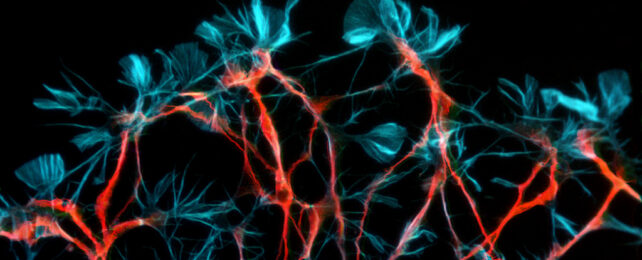Alzheimer's disease remains incurable, despite the best efforts of scientists and a number of recent discoveries.
Now researchers have a new hypothesis about a possible driving force behind the disease: a type of sugar called fructose.
Previous research has indicated that fructose in the brain helped our ancestors forage for food. But the new paper suggests that, in our modern world, the changes this sugar triggers could actually be linked to Alzheimer's.
Fructose is found in many foods, such as fruits, vegetables, and honey.
But it can also be produced by the body naturally, for example by pathways that are stimulated by consumption of a high salt diet.
So how did fructose help our ancestors? The sugar inhibits certain parts of the brain's metabolism: blocking distractions, such as recent memories and paying attention to the passing of time.
That 'switching off' of certain brain activities helps us focus better on survival, and also prompts exploratory and risk-taking behavior, all important for foraging.
In the latest study, the researchers argue is that this 'survival switch' is now permanently on, even though most of us do very little foraging these days.
That is driving us to take in more high fat, sugary, and salty food than we need in order to produce more fructose.
And this in turn could lead to inflammation in the brain and ultimately the conditions that cause Alzheimer's disease, the scientists propose.
"We believe that initially the fructose-dependent reduction in cerebral metabolism in these regions was reversible and meant to be beneficial," says Richard Johnson, a nephrologist at the University of Colorado Anschutz Medical Center.
"But chronic and persistent reduction in cerebral metabolism driven by recurrent fructose metabolism leads to progressive brain atrophy and neuron loss with all of the features of Alzheimer's disease."
This latest study doesn't include any new lab research, but what it does do is carefully join the dots between previous studies, including those linking fructose with survival, and linking fructose with Alzheimer's.
The researchers hypothesize that the effects of fructose and its byproduct, intracellular uric acid, are causing the build-up of proteins linked to Alzheimer's disease.
Those effects include reducing blood flow to the cerebral cortex, hippocampus, and thalamus, and increasing blood flow around the visual cortex (linked to food reward signals).
One way this could happen is through the failure of brain cells called astrocytes, which can lead to the amyloid plaque accumulation linked with Alzheimer's.
The researchers also point to associations between various Alzheimer's risk factors (such as alcohol consumption) and fructose production, as well as looking at animal studies.
"A study found that if you keep laboratory rats on fructose long enough, they get tau and amyloid beta proteins in the brain, the same proteins seen in Alzheimer's disease," says Johnson. "You can find high fructose levels in the brains of people with Alzheimer's as well."
The next step is more tests to establish just what the role of fructose and uric acid metabolism is in the brain, and how it might lead to the conditions that are associated with Alzheimer's disease.
"We make the case that Alzheimer's disease is driven by diet," says Johnson.
"We suggest that both dietary and pharmacologic trials to reduce fructose exposure or block fructose metabolism should be performed to determine if there is potential benefit in the prevention, management or treatment of this disease."
The research has been published in the American Journal of Clinical Nutrition.
